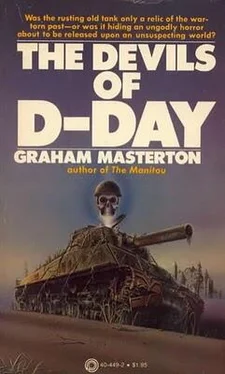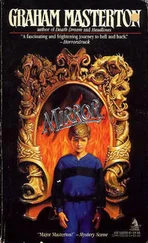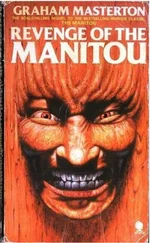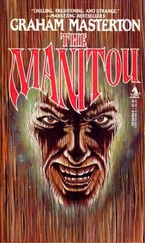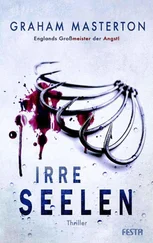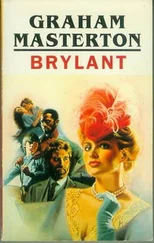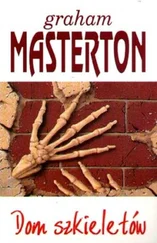I looked around at the dank hedgerow for a while, and then I started the car up again and drove along to Madeleine’s farm. I turned into the gate and splashed across the muddy yard, with chickens flapping and skittering all around me, and a flock of grubby geese rushing away like athletes on a cross-country run.
I stepped out of the car, being careful where I put my feet, and reached in for my presents. A door opened behind me, and I heard someone walking my way. A voice said, “ Bonjour, monsieur. Qu’est-ce que vous voulez? ”
A short Frenchman in muddy pants, muddy boots and a muddy brown jacket was standing in the yard with his hands in his pockets. He had a long Norman face, and he was smoking a Gauloise that appeared to be permanently stuck to his lip. His beret was pulled well down to his ears, which made him look pretty rural, but his eyes were bright and he looked like the kind of farmer who didn’t miss a trick.
“My name’s Dan McCook,” I told him. “Your daughter Madeleine invited me for lunch. Er— pour déjeuner? ”
The farmer nodded. “Yes, monsieur. She tells me this. I am Jacques Passerelle.”
We shook hands. I offered him the bottle of wine, and said, “I brought you this. I hope you like it. It’s a bordeaux.”
Jacques Passerelle paused for a moment, and reached in his breast pocket for a pair of wire-rimmed spectacles. He hooked them around his ears, and scrutinised the bottle closely. I felt as if I’d had the down-right effrontery to give a vacuum pack of A&P bacon to a Kentucky hog farmer. But the Frenchman nodded again, put away his spectacles, and said, “ Merci bien, monsieur . I save this for dimanche. ”
He ushered me through the stable door into the kitchen. The old woman Eloise was there, in her dark grey dress and her white lace cap, boiling a huge copper pan full of apples. Jacques introduced me, and we shook hands. Her fingers were soft and dry, and she was wearing a silver ring with a miniature Bible on it. She had one of those flat, pale, wrinkled faces that you sometimes see staring out of the windows of old people’s homes, or from the windows of buses on old people’s outings. But she seemed to be independent and strong around the Passerelle home, and she walked with a straight back.
She said, “Madeleine told me you were interested in the tank.”
I glanced at Jacques, but he didn’t seem to be listening. I coughed, and said, “Sure. I’m making a map of these parts for a book about D-Day.”
“The tank has been here since July, 1944. Mid-July. It died on a very hot day.”
I looked at her. Her eyes were washed-out blue, like the sky after a spring shower, and you didn’t quite know whether she was looking inwards or outwards. I said, “Maybe we can talk after lunch.”
Out of the steamy, apple-aromatic kitchen, we walked along a narrow dark hallway with a bare boarded floor. Jacques opened a door in the side of the hall, and said, “You would care for an aperitif?”
This was obviously his front parlour, the room he kept only for visitors. It was gloomy, heavily-curtained, and it smelled of dust and stale air and furniture polish. There were three chintz armchairs in the style you can see in any large French meubles store, a copper warming-pan hanging on the wall, a plastic madonna with a small container of holy water, and a dark-varnished sideboard with photographs of weddings and grandchildren, each on its own lace doily. A tall clock ticked away the winter morning, weary and slow.
“I’d like a calvados, please,” I told Jacques. “I don’t know anything better for warming yourself up on a cold day. Not even Jack Daniels.”
Jacques took two small glasses from the sideboard, uncorked the calvados, and poured it out. He handed one over, and lifted his own glass solemnly.
“Santé,” he said quietly, and downed his drink in one gulp.
I sipped mine more circumspectly. Calvados, the apple-brandy of Normany, is potent stuff, and I did want to do some sensible work this afternoon.
“You have been here in summer?” asked Jacques.
“No, never. This is only my third trip to Europe.”
“It’s not so pleasant in winter. The mud, and the frost. But in summer, this is very beautiful. We have visitors from all over France, and Europe. You can hire boats and row along the river.”
“It sounds terrific. Do you have many Americans?”
Jacques shrugged. “One or two. Some Germans sometimes, too. But not many come here. Pont D’Ouilly is still a painful memory. The Germans ran away from here as if the devil himself were after them.”
I swallowed some more calvados, and it glowed down my throat like a shovelful of hot coke. “You’re the second person who’s said that,” I told him. “ Der Teufel. ”
Jacques gave a small smile, which reminded me of the wav that Madeleine smiled.
“I must change my clothes,” he said. “I don’t like to sit down for lunch looking like a mud man.”
“Go ahead,” I told him. “Will Madeleine be down.”
“In a moment. She wanted to put on cosmetics. Well… we don’t have many visitors.”
Jacques went off to clean himself up, and I went over to the window and looked out across the orchard. The fruit trees were all bare now, and pruned, and the grass was white with cold. A bird perched for a moment on the rough fence of silver-birch at the far end of the garden, and then fluttered off. I turned back into the room.
On the sideboard, one of the photographs showed a young girl with a wavy 1940s hairstyle, and I guessed that must have been Madeleine’s mother. There was a colour picture of Madeleine as a baby, with a smiling priest in the background, and a formal portrait of Jacques in a high white collar. Besides all these was a bronze model of a medieval cathedral, with a ring of twisted hair around its spire. I couldn’t really work out what that was supposed to mean, but then I wasn’t a Roman Catholic, and I wasn’t really into religious relics.
I was just about to pick up the model to take a better look when the parlour door opened. It was Madeleine, in a pale cream cotton dress, her dark-blonde hair brushed back and held with tortoiseshell combs, her lips bright red with lipstick.
“Please—” she said. “Don’t touch that.”
I raised my hands away from the tiny cathedral. “I’m sorry. I was only going to take a look.”
“It’s something of my mother’s.”
“I’m sorry.”
“That’s all right. don’t think about it. Did father give you a drink?”
“Sure. A calvados. It’s making my ears ring already Are you going to join me?”
She shook her head. “I can’t drink it. They gave it to me once when I was twelve and I was sick. Now, I only drink wine.”
She sat down, and I sat opposite. “You shouldn’t have dressed up specially for me,” I told her. “But all the same, you look beautiful.”
She blushed. Not much, just a small tinge on the cheeks, but it was a blush all right. I hadn’t come across that kind of modesty for years.
I said, “I had a real weird experience last night. I was walking back to my car, and I could have sworn I saw something on the road.”
She looked up. “What was it?”
“Well, I’m not too sure. It was like a small child, but it was too thin and bony for a small child.”
She looked at me for several silent seconds. Then she said, “I don’t know. It must have been the snow.”
“It scared the hell out of me, whatever it was.”
She picked absentmindedly at the braiding on the arm of her chair. “It’s the atmosphere, the ambience , around the tank. It makes people feel things, see things, that aren’t there. Eloise will tell you some of the stories if you want.”
Читать дальше
